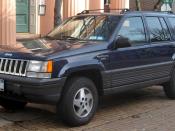On a clear a day around 2:30 pm on Feb. 12th of this year, my mother, her supervisor, and his boss were traveling from Wilmington to Charlotte, North Carolina on a routine business trip on Hwy 74. Just as they were about to intersect with a small side road, a 73-year-old elderly woman pulled out onto the hwy, failing to see the oncoming Jeep Grand Cherokee. My mother, the driver of the Jeep, swerved to dodge the intruding 1984 Lincoln Towncar, but the lady had pulled into both lanes. Upon contact, the Jeep rolled over the Lincoln and flipped 7 to 8 times. It gave minor fractions and multiple bruises to my mother, broke both of her supervisor's boss's legs, and decapitated her 37 yr old supervisor. It was a clear day. The roads were flat. And it was estimated that my mother was traveling at 58 in a 55 mph zone.
Upon questioning, the old lady simply remarked, "I never saw the truck"ÃÂ. Because of this lady's mistake, Todd Hodges, her supervisor, leaves behind two toddlers to be raised never knowing their father.
The blame, however, is not to be put on the elderly lady, but rather on the lack of regulations and testing set forth by the DMV of North Carolina. Every year, hundreds of road fatalities occur because elderly people who have become unfit for safe driving continue to carry a license. With automobile fatality rates increasing and already matching those of young adults, elderly people need to be tested annually for physical and mental deterioration that contributes to making them a danger on the road.
According to the American Surgeon, rates for automobile accidents among young adults and those over 65 are about the same. However, because elderly drivers tend to drive fewer miles, their risk...


